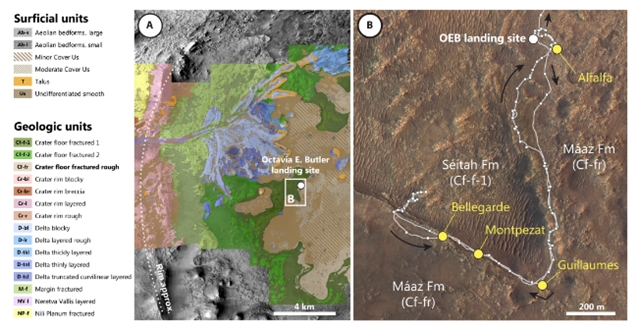
英国剑桥大学Nicholas J. Tosca团队近日研究了火星耶泽洛陨石坑Máaz地层内蛇纹石化的现场证据。2025年7月4日出版的《科学-进展》杂志发表了这项成果。
作为大气H2的来源和液态水的汇,含橄榄石岩石的蛇纹石化被广泛认为影响了早期火星大气和水圈的长期演化。
然而,这一过程的机制、时间和全球重要性是不受限制的,部分原因是古代蛇纹石系统的残余尚未在原位进行检查。来自火星2020“毅力号”探测器上的多种仪器的新的地球化学和矿物学数据记录了在耶泽罗陨石坑底部暴露的Máaz组古代火成岩中的蛇纹石化和相关的H2生成。这些数据,结合岩石成因的限制,表明蛇纹岩化可能是由岩浆水的脱挥发驱动的,突出了H2的产生与古火星火山口岩浆活动的风格和速度之间的潜在联系。
附:英文原文
Title: In situ evidence for serpentinization within the Máaz formation, Jezero crater, Mars
Author: Nicholas J. Tosca, Michael M. Tice, Joel A. Hurowitz, David A. K. Pedersen, Jesper Henneke, Lucia Mandon, Francis M. McCubbin, Oliver Ross, Po-Yen Tung, Richard J. Harrison, An Li, Mariek E. Schmidt, Tanya V. Kizovski, Yang Liu, Lisa Mayhew, Michael W. M. Jones, Josh Labrie, Scott Davidoff, Abigail C. Allwood, Olivier Beyssac, Adrian Brown, Morgan Cable, Jade Comellas, Benton C. Clark, Adrian E. Galvin, Briony Horgan, Christopher M. Heirwegh, Peter Nemere, Brendan J. Orenstein, Cathy Quantin-Nataf, Clément Royer, Allan Treiman, Lawrence A. Wade, Roger Wiens, Austin P. Wright
Issue&Volume: 2025-07-04
Abstract: As both a source of atmospheric H2 and a sink for liquid water, the serpentinization of olivine-bearing rocks is widely thought to have influenced the long-term evolution of the early martian atmosphere and hydrosphere. However, the mechanisms, timing, and global importance of this process are unconstrained, in part because the remnants of ancient serpentinizing systems have not been examined in situ. New geochemical and mineralogical data from multiple instruments aboard the Mars 2020 Perseverance rover record serpentinization and associated H2 production in ancient igneous rocks of the Máaz formation, exposed on the Jezero crater floor. These data, combined with petrogenetic constraints, indicate that serpentinization may have been driven by devolatilization of magmatic H2O, highlighting a potential link between H2 production and the style and tempo of magmatism within the ancient martian crust.
DOI: adr8793
Source: https://www.science.org/doi/10.1126/sciadv.adr8793
